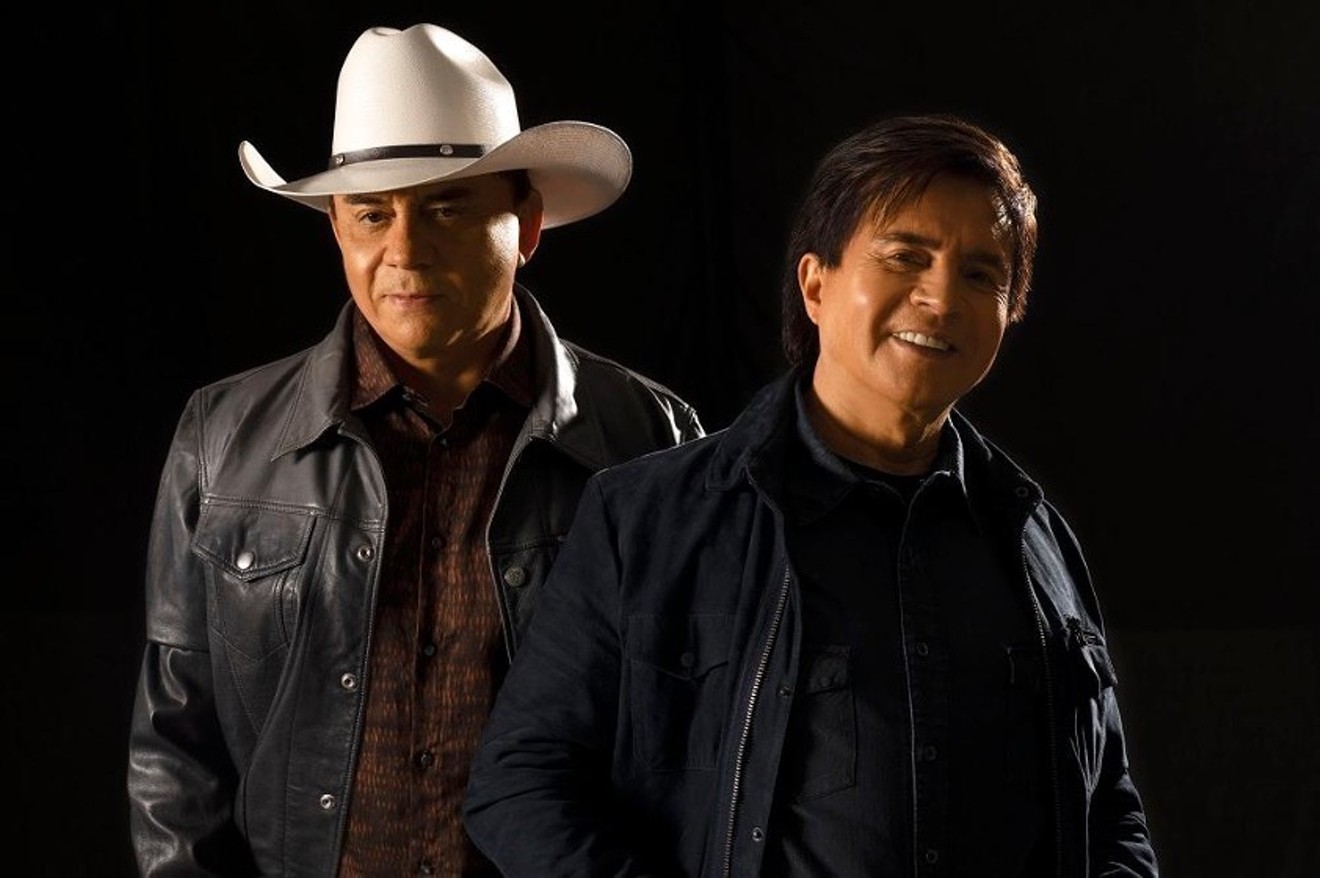When brothers José Lima Sobrinho and Durval de Lima started in the early 1970s, there was no such thing as sertanejo, the genre comparable to American country music. At the time, it was still called caipira, a much simpler musical form relegated to county fairs and small stages in the Brazilian countryside.
"It was guitar, Brazilian viola (a ten-stringed guitar created similar to the Portuguese guitar) or sometimes a trio of two guitars and an accordion," Lima Sobrinho tells New Times over Zoom. "Artists didn't have much production; it was very acoustic, very raw. They'd never do big events, mostly circuses or small events in the countryside. In big cities, folks were ashamed of admitting they even liked this kind of music."
Under the stage names of Chitãozinho & Xororó, Lima Sobrinho and de Lima gradually grew sertanejo's popularity — but the path forward was not easy.
"The first seven or eight years were very difficult," Lima Sobrinho recalls. "Sertanejo was not well received in large cities — there was a lot of prejudice. It was later that things began to change, and we started adding more sophisticated instrumentation."
Like many artists in their genre, Chitãozinho & Xororó had humble beginnings in the small town of Rondon in southern Brazil.
"Singing for us is a family affair. Our uncles and parents all performed, and we learned how to do it from a very young age," Lima Sobrinho says. "We'd sing at home, at the sawmill where my father worked. We'd sing in church, at school, at parties. And then, our parents moved to São Paulo in the late '60s, and in 1970, we began our professional musical career.
"This 50th-anniversary tour was supposed to have happened in 2020," he adds, "but then COVID hit, we were delayed for two years, so we are actually celebrating 52 years together now."
Throughout their career, the brothers have brought the production level to sertanejo often found in rock and pop concerts.
"We listened to a lot of Brazilian and also English-language pop music, and I realized that they put on beautiful shows, and that did not exist in sertanejo at the time," Lima Sobrinho explains. "The first thing we did when we started being successful was to set up a good band. We bought our own sound equipment, lighting, trucks, and so we were able to put on the same quality performance that was seen and heard in pop music."
The investment paid off. Chitãozino & Xororó are currently amid an international tour, including a sold-out performance at Radio City Music Hall in New York City last week and additional dates in Fort Lauderdale, Orlando, and Boston.
"We had to break many barriers, especially in the media, but we have earned the respect of many important artists in Brazil, journalists, and TV hosts, and this came to be because of the quality of our work," Lima Sobrinho adds.
Lima Sobrinho remains hopeful for the future of the music genre Chitãozino & Xororó helped revolutionize.
"The music has reached the place it deserves to be," he says. "There is a new generation that is carrying on, renewing things. Today in Brazil, sertanejo has the largest market share in the country. It works because it's romantic and also traditional, so today the public consumes a bit of everything, and that has been very good for us."
Chitãozino & Xororó. 8 p.m. Friday, September 9, at Broward Center for the Performing Arts, 201 SW Fifth Ave, Fort Lauderdale; 954-462-0222; browardcenter.org. Tickets cost $65.41 to $186.91 via ticketmaster.com.
Interviews
Chitãozinho & Xororó Aren't Done Championing Sertanejo's Popularity
When Chitãozinho & Xororó started out, there was no such thing as sertanejo.

Chitãozinho & Xororó
Photo by Marcos Hermes
[
{
"name": "Editor Picks",
"component": "17482312",
"insertPoint": "4",
"requiredCountToDisplay": "1"
},{
"name": "Inline Links",
"component": "18711090",
"insertPoint": "8th",
"startingPoint": 8,
"requiredCountToDisplay": "7",
"maxInsertions": 25
},{
"name": "Air - MediumRectangle - Combo - Inline Content",
"component": "17482310",
"insertPoint": "8th",
"startingPoint": 8,
"requiredCountToDisplay": "7",
"maxInsertions": 25
},{
"name": "Inline Links",
"component": "18711090",
"insertPoint": "8th",
"startingPoint": 12,
"requiredCountToDisplay": "11",
"maxInsertions": 25
},{
"name": "Air - Leaderboard Tower - Combo - Inline Content",
"component": "17482313",
"insertPoint": "8th",
"startingPoint": 12,
"requiredCountToDisplay": "11",
"maxInsertions": 25
}
]










